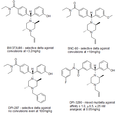Δ-opioid receptor
Δ-opioid receptor (also known as DOR) is one of the four members of the opioid receptor family, along with the mu-opioid receptor (MOR), kappa-opioid receptor (KOR), and nociceptin receptor (NOP). These receptors are a group of G protein-coupled receptors (GPCRs) that are activated by the body's own endorphins as well as by exogenous compounds, such as morphine and other opioids.
Function[edit]
The Δ-opioid receptor primarily mediates the effects of the endogenous opioids enkephalins. It is involved in a variety of physiological and pathological processes, including pain modulation, mood regulation, immune response, and neuroprotection.
Structure[edit]
Like other GPCRs, the Δ-opioid receptor is composed of seven transmembrane domains connected by three extracellular and three intracellular loops. The N-terminus is located extracellularly, while the C-terminus is intracellular.
Ligands[edit]
Several endogenous and exogenous ligands are known to bind to the Δ-opioid receptor. The endogenous ligands include the enkephalins, while the exogenous ligands include a variety of opioids, such as deltorphins and naltrindole.
Clinical significance[edit]
The Δ-opioid receptor is a potential target for the treatment of pain, depression, and anxiety disorders. However, the development of selective Δ-opioid receptor agonists has been challenging due to the high homology between the opioid receptors.
See also[edit]
This GPCR-related article is a stub. You can help WikiMD by expanding it.
Δ-opioid receptor[edit]
-
Delta opioid ligands
-
Delta Ligands
Ad. Transform your life with W8MD's Budget GLP-1 injections from $49.99


W8MD offers a medical weight loss program to lose weight in Philadelphia. Our physician-supervised medical weight loss provides:
- Weight loss injections in NYC (generic and brand names):
- Zepbound / Mounjaro, Wegovy / Ozempic, Saxenda
- Most insurances accepted or discounted self-pay rates. We will obtain insurance prior authorizations if needed.
- Generic GLP1 weight loss injections from $49.99 for the starting dose of Semaglutide and $65.00 for Tirzepatide.
- Also offer prescription weight loss medications including Phentermine, Qsymia, Diethylpropion, Contrave etc.
NYC weight loss doctor appointmentsNYC weight loss doctor appointments
Start your NYC weight loss journey today at our NYC medical weight loss and Philadelphia medical weight loss clinics.
- Call 718-946-5500 to lose weight in NYC or for medical weight loss in Philadelphia 215-676-2334.
- Tags:NYC medical weight loss, Philadelphia lose weight Zepbound NYC, Budget GLP1 weight loss injections, Wegovy Philadelphia, Wegovy NYC, Philadelphia medical weight loss, Brookly weight loss and Wegovy NYC
|
WikiMD's Wellness Encyclopedia |
| Let Food Be Thy Medicine Medicine Thy Food - Hippocrates |
Medical Disclaimer: WikiMD is not a substitute for professional medical advice. The information on WikiMD is provided as an information resource only, may be incorrect, outdated or misleading, and is not to be used or relied on for any diagnostic or treatment purposes. Please consult your health care provider before making any healthcare decisions or for guidance about a specific medical condition. WikiMD expressly disclaims responsibility, and shall have no liability, for any damages, loss, injury, or liability whatsoever suffered as a result of your reliance on the information contained in this site. By visiting this site you agree to the foregoing terms and conditions, which may from time to time be changed or supplemented by WikiMD. If you do not agree to the foregoing terms and conditions, you should not enter or use this site. See full disclaimer.
Credits:Most images are courtesy of Wikimedia commons, and templates, categories Wikipedia, licensed under CC BY SA or similar.
Translate this page: - East Asian
中文,
日本,
한국어,
South Asian
हिन्दी,
தமிழ்,
తెలుగు,
Urdu,
ಕನ್ನಡ,
Southeast Asian
Indonesian,
Vietnamese,
Thai,
မြန်မာဘာသာ,
বাংলা
European
español,
Deutsch,
français,
Greek,
português do Brasil,
polski,
română,
русский,
Nederlands,
norsk,
svenska,
suomi,
Italian
Middle Eastern & African
عربى,
Turkish,
Persian,
Hebrew,
Afrikaans,
isiZulu,
Kiswahili,
Other
Bulgarian,
Hungarian,
Czech,
Swedish,
മലയാളം,
मराठी,
ਪੰਜਾਬੀ,
ગુજરાતી,
Portuguese,
Ukrainian

